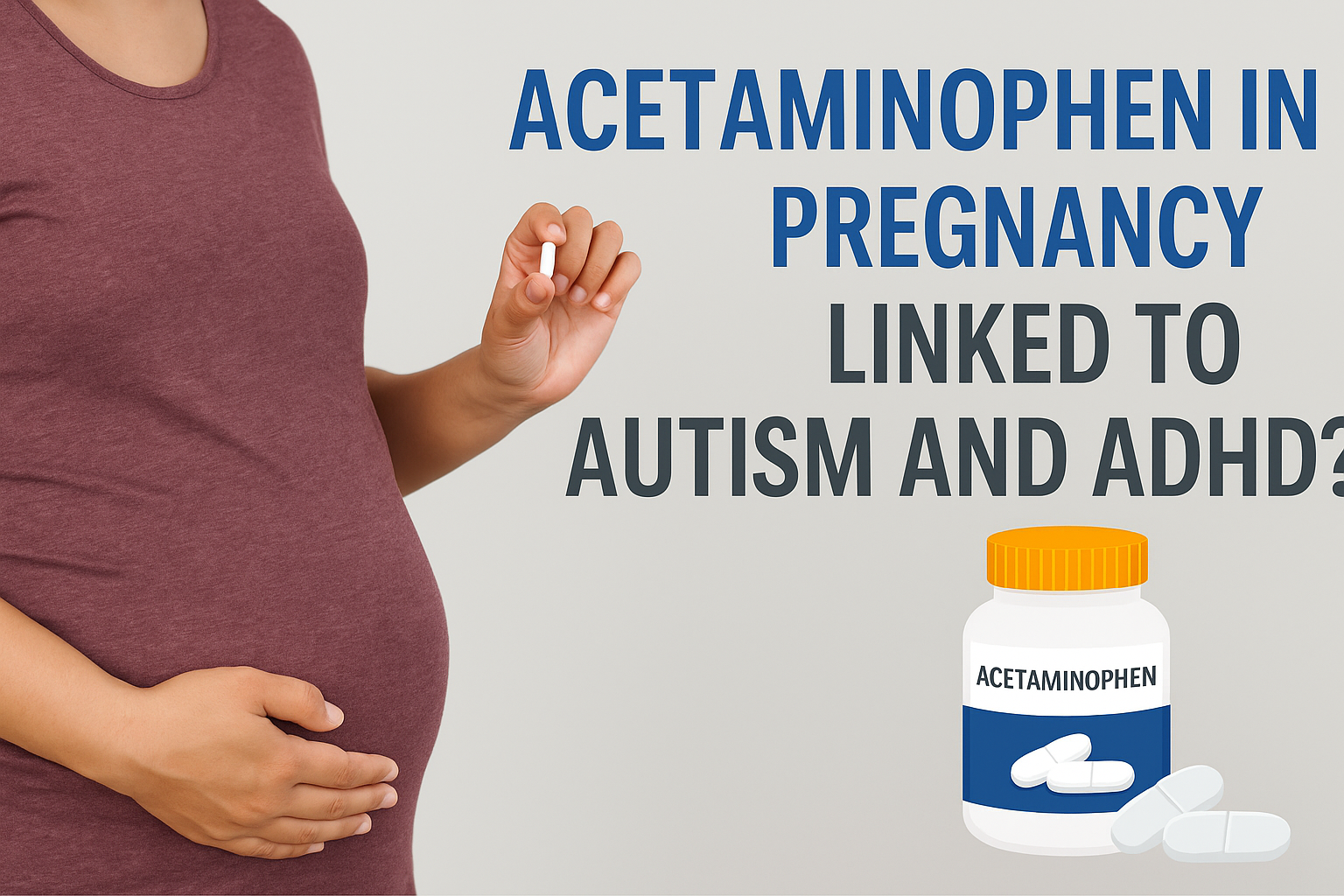Acetaminophen in Pregnancy and Autism/ADHD: What the Evidence Really Says
Acetaminophen (also known as paracetamol or by the brand name Tylenol) is one of the most widely used medications in pregnancy. It’s recommended for fever and pain and has long been considered safe when taken as directed. In fact, studies show that more than 50% of pregnant women worldwide use acetaminophen at some point during pregnancy (Bandoli et al., 2019).
But concerns have grown in recent years, with some media headlines and even political statements suggesting that acetaminophen could be linked to autism spectrum disorder (ASD) and attention-deficit/hyperactivity disorder (ADHD). So what does the evidence really say?
Autism, ADHD, and the Search for Causes
Rates of ASD and ADHD diagnoses have increased sharply in recent decades. In the U.S., ASD prevalence rose by 98% from 2010 to 2020, while ADHD diagnoses increased by 36% from 2003 to 2019 (Chu et al., 2025). These trends have pushed researchers to explore possible environmental, genetic, and prenatal risk factors — including acetaminophen.
Key Studies on Acetaminophen in Pregnancy
Swedish Sibling-Controlled Study (2024)
- Population: 2.48 million children born 1995–2019
- Finding: Slightly higher autism/ADHD risk in general population (HR ≈ 1.05–1.07).
- But: In sibling comparisons (one exposed, one not), the link disappeared (HR ≈ 1.00).
- Takeaway: Family and genetic factors likely explain earlier signals, not the drug itself (Ahlqvist et al., 2024).
Danish Birth Cohort (2014)
- Population: 64,322 pregnancies
- Finding: Higher risk of hyperkinetic disorders, ADHD medication use, and behavioral issues (HR = 1.29–1.37).
- Dose–response trend: Stronger when used across multiple trimesters.
- Limitations: Self-reported use; observational (Liew et al., 2014).
Umbilical Cord Blood Biomarkers (2020)
- Population: 996 newborns
- Finding: Higher acetaminophen levels → 2–3x greater odds of ADHD and ASD.
- Strength: Biomarker-based, not self-report.
- Limitation: Confounding by reason for use (e.g., fever itself may impact outcomes) (Ji et al., 2020).
Possible Biological Mechanism
A 2025 review suggested that the metabolite NAPQI, a known mitochondrial toxin, may disrupt fetal brain development by impairing energy metabolism and causing neuroinflammation (Chu et al., 2025). This is still a theory, not proven in human pregnancy.
Systematic Reviews and FDA Guidance
- Systematic review (2025): Out of 46 studies, 27 showed positive associations, 9 showed none, 4 even showed protective effects. Studies with stronger methods leaned toward risk, but results remain inconsistent (Prada et al., 2025).
- FDA (2025): Acknowledged possible association; advises limiting acetaminophen use in pregnancy to medically necessary cases. Many experts say the evidence is too weak to change practice guidelines.
Bottom Line for Pregnant Women
- ✅ Acetaminophen is still considered safe in pregnancy when used as directed.
- ✅ Use the lowest effective dose for the shortest possible time.
- ✅ Always consult a healthcare provider before taking any medication.
- ⚠️ Avoid fear-driven headlines — skipping proven treatments can sometimes be riskier than the medication itself.
FAQs
1. Is acetaminophen safe during pregnancy?
Yes, when used appropriately and under medical guidance.
2. Does acetaminophen cause autism or ADHD?
No causal link has been proven. The best studies suggest family/genetic factors explain most of the association.
3. Should I stop taking acetaminophen while pregnant?
Do not stop or start any medication without talking to your doctor. Use only when medically needed.
Medical Disclaimer
This article is for informational and educational purposes only. It is not medical advice and should not replace consultation with a licensed physician, pharmacist, or qualified healthcare provider. Always seek professional medical advice before starting, stopping, or changing any medication during pregnancy.
References
1. Ahlqvist, V. H., Sjöqvist, H., Dalman, C., Karlsson, H., Stephansson, O., Johansson, S., Magnusson, C., Gardner, R. M., & Lee, B. K. (2024). Acetaminophen Use During Pregnancy and Children’s Risk of Autism, ADHD, and Intellectual Disability. JAMA, 331(14), 1205–1214. https://doi.org/10.1001/jama.2024.3172 2. Bandoli, G., Palmsten, K., & Chambers, C. D. (2019). Acetaminophen use in pregnancy: Examining prevalence, timing, and indication of use in a prospective birth cohort. Paediatric and Perinatal Epidemiology, 34, 237–246. https://doi.org/10.1111/ppe.12595 3. Liew, Z., Ritz, B., Rebordosa, C., Lee, P. C., & Olsen, J. (2014). Acetaminophen use during pregnancy, behavioral problems, and hyperkinetic disorders. JAMA Pediatrics, 168(4), 313–320. https://doi.org/10.1001/jamapediatrics.2013.4914 4. Ji, Y., Azuine, R. E., Zhang, Y., et al. (2020). Association of Cord Plasma Biomarkers of In Utero Acetaminophen Exposure With Risk of ADHD and ASD in Childhood. JAMA Psychiatry, 77(2), 180–189. https://doi.org/10.1001/jamapsychiatry.2019.3259 5. Chu, S., Woodfin, S., Bayliss, E., et al. (2025). Acetaminophen’s Role in Autism and ADHD: A Mitochondrial Perspective. International Journal of Molecular Sciences, 26(17), 8585. https://doi.org/10.3390/ijms26178585 6. Prada, D., Ritz, B., Bauer, A. Z., & Baccarelli, A. A. (2025). Evaluation of the evidence on acetaminophen use and neurodevelopmental disorders using the Navigation Guide methodology. Environmental Health, 24(1), 56. https://doi.org/10.1186/s12940-025-01208-0 7. U.S. Food & Drug Administration. (2025). U.S. Food & Drug Administration. (2025). FDA responds to evidence of possible association between autism and acetaminophen use during pregnancy. https://www.fda.gov/news-events/press-announcements/fda-responds-evidence-possible-association-between-autism-and-acetaminophen-use-during
